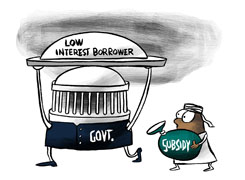Ramalingam Kalirajan |1253 Answers |Ask -Follow
Mutual Funds, Financial Planning Expert - Answered on Apr 18, 2024
He has an MBA in finance from the University of Madras and is a certified financial planner.
He is the director and chief financial planner at Holistic Investment, a Chennai-based firm that offers financial planning and wealth management advice.... more

How to get personal loan when cibil score is low
Improve Your CIBIL Score (if possible):
Check and Fix Errors: Ensure your credit report is accurate. Dispute any errors you find with CIBIL to improve your score.
Reduce Credit Utilization: Pay down existing credit card balances to bring your credit utilization ratio (outstanding credit divided by credit limit) below 30%.
Maintain a Good Repayment History: Make timely payments on all your existing loans and credit cards.
Approaching Lenders:
Focus on NBFCs and Fintech lenders: These lenders may be more flexible with credit score requirements compared to traditional banks.
Apply with a Co-applicant: Having a co-applicant with a good credit score can significantly improve your chances of loan approval and potentially get you a better interest rate.
Offer Collateral (if possible): Securing the loan with collateral like a car or fixed deposit can make it more attractive to lenders, even with a low credit score.
Negotiate Loan Terms: You might be able to negotiate a smaller loan amount or a slightly higher interest rate to get approved.
Additional Tips:
Compare Loan Offers: Get quotes from multiple lenders to compare interest rates and terms before finalizing a loan.
Borrow Only What You Need: Avoid borrowing more than you can comfortably repay.
Be Wary of High-Cost Loans: Steer clear of lenders offering very high interest rates or predatory loan terms.
Here are some resources that you might find helpful:
CIBIL Website: https://www.cibil.com/
Paisabazaar - Personal Loan for Low Credit Score: https://www.paisabazaar.com/credit-score/cibil-score-for-personal-loan/
ICICI Bank - Personal Loan with Low Credit Score: https://www.icicibank.com/blogs/personal-loan/personal-loan-with-a-low-cibil-score
Remember, a low CIBIL score can lead to higher interest rates on your loan. So it's important to weigh the cost of the loan against your needs before proceeding.
You may like to see similar questions and answers below
Sanjeev Govila |458 Answers |Ask -Follow
Financial Planner - Answered on Sep 20, 2023
Ramalingam Kalirajan |1253 Answers |Ask -Follow
Mutual Funds, Financial Planning Expert - Answered on Apr 30, 2024
Ramalingam Kalirajan |1253 Answers |Ask -Follow
Mutual Funds, Financial Planning Expert - Answered on May 02, 2024
Ramalingam Kalirajan |1253 Answers |Ask -Follow
Mutual Funds, Financial Planning Expert - Answered on May 02, 2024
Ramalingam Kalirajan |1253 Answers |Ask -Follow
Mutual Funds, Financial Planning Expert - Answered on May 02, 2024
Patrick Dsouza |203 Answers |Ask -Follow
CAT, XAT, CMAT, CET Expert - Answered on May 02, 2024
Patrick Dsouza |203 Answers |Ask -Follow
CAT, XAT, CMAT, CET Expert - Answered on May 02, 2024
Dr Deepa Suvarna |105 Answers |Ask -Follow
Paediatrician - Answered on May 02, 2024
Patrick Dsouza |203 Answers |Ask -Follow
CAT, XAT, CMAT, CET Expert - Answered on May 02, 2024
Patrick Dsouza |203 Answers |Ask -Follow
CAT, XAT, CMAT, CET Expert - Answered on May 02, 2024
Patrick Dsouza |203 Answers |Ask -Follow
CAT, XAT, CMAT, CET Expert - Answered on May 02, 2024
Patrick Dsouza |203 Answers |Ask -Follow
CAT, XAT, CMAT, CET Expert - Answered on May 02, 2024























